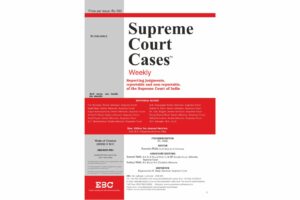Competition Act, 2002 — Ss. 3(1), 19 and 26(1) — Jurisdiction of CCI vis-à-vis lottery business: Enquiry by CCI into bid rigging, collusive bidding, and cartelisation in the tender process for appointment of selling agents and distributors for lotteries, is permissible. [CCI v. State of Mizoram, (2022) 7 SCC 73]
Contract and Specific Relief — Specific Contracts — Guarantee/Surety — Bank guarantee: Invocation/encashment of performance bank guarantee is not permissible when conditions stipulated for such action are not satisfied. [Union of India v. Millenium Delhi Broadcast LLP, (2022) 7 SCC 67]
Criminal Law — Criminal Trial — Practice and Procedure — Forum shopping: Principles clarified regarding what is forum shopping, how it is determined and bar against the it, as the same amounts to abuse of process. [Vijay Kumar Ghai v. State of W.B., (2022) 7 SCC 124]
Criminal Law — Criminal Trial — Witnesses — Generally: Three types of winessess, distinguished. Manner of appreciation of testimony of each type of witness also indicated. [Mahendra Singh v. State of M.P., (2022) 7 SCC 157]
Income Tax — Business or Revenue Expenditure: Expenses incurred by pharmaceutical company for distribution of incentives i.e. “freebies” to medical practitioners/doctors are not eligible for the benefit of S. 37(1) of the IT Act, 1961 i.e. for the expenditure to be allowed in computing the income chargeable, as the same fell within the umbrage of S. 37(1) Expln. 1 of the IT Act, 1961. [Apex Laboratories (P) Ltd. v. CIT, (2022) 7 SCC 98]
Indian Medicine Central Council Act, 1970 — Ss. 13-A to 13-C [as substituted by the Indian Medicine Central Council (Amendment) Act, 2003], 22 and 36(1)(j): As per S. 13-A r/w Ss. 22 and 36(1)(j) of the 1970 Act, no medical college can open a new or higher course of study or training, including a postgraduate course, except with the previous permission of the Central Government and, prior to such a permission being granted, the procedure as prescribed under S. 13-A has to be followed. This legislative intent, held, is further clarified by the provisions made in S. 13-B of the Act, which provide that in absence of requisite prior sanction of the Central Government, medical qualification granted to any student shall not be deemed to be a recognised medical qualification for the purposes of the Act. Further, as per Regn. 3(1)(a) of the 2016 Regulations, in order to be eligible for grant of permission for undertaking admissions in a particular academic session, the institution must fulfil the requirements of minimum standard as on 31st December of the earlier year. Benefit of grant of permission for new course of study, for subsequent years would not enure in respect of the previous year also. [Central Council for Indian Medicine v. Karnataka Ayurveda Medical College, (2022) 7 SCC 46]
Registration Act, 1908 — Ss. 73 and 35 — Denial of execution by signatory — Permissibility of, even when the person signing the instrument/agreement admits signatures: The “execution” of a document does not stand admitted merely because a person admits to having signed the document. Further, if the interpretation equating signing with execution is adopted, it would ensure that the Sub-Registrars/Registrars will continuously end up registering documents whose validity will inevitably be then disputed in a civil suit or a writ petition and while the suit or writ proceedings continue, the document would remain on the public records as a registered instrument, having the potential to cause more disruption and mischief. Thus, even if a person’s signature on the document is admitted, they can still deny its execution if they did not agree to or understand the contents of the document while signing it. [Veena Singh v. Collector, (2022) 7 SCC 1]
Transfer of Property Act, 1882 — Ss. 7, 8, 3, 54 and 41 — Competence to transfer property: Cancellation of alienations/setting aside of documents of transfer is not required in case of unauthorised sale by agent. Principle of nemo dat quod non habet i.e. no one can confer a better title than what he himself has will be applicable. [Umadevi Nambiar v. Thamarasseri Roman Catholic Diocese, (2022) 7 SCC 90]
W.B. Land Reforms Act, 1955 (10 of 1956) — S. 8 r/w S. 9: Deposit of the entire sale consideration with additional 10% of the sale consideration along with the preemption application is a statutory and mandatory requirement and it is a precondition before any further enquiry as contemplated under S. 9 is held. [Abdul Matin Mallick v. Subrata Bhattacharjee, (2022) 7 SCC 147]

